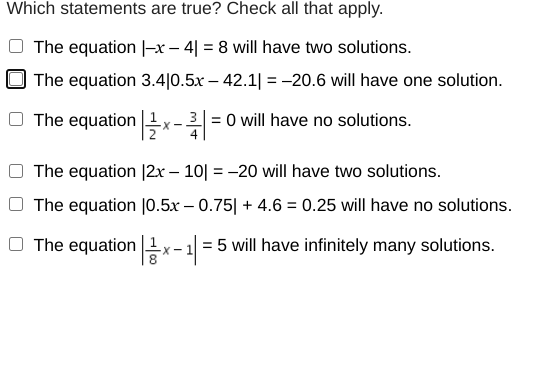Which statements are true? Check all that apply.
The equation |–x – 4| = 8 will have two solutions. The equation 3.4|0.5x – 42.1| = –20.6 will have one solution. The equation StartAbsoluteValue StartFraction one-half EndFraction x minus StartFraction 3 Over 4 EndFraction EndAbsoluteValue equals 0. = 0 will have no solutions. The equation |2x – 10| = –20 will have two solutions. The equation |0.5x – 0.75| + 4.6 = 0.25 will have no solutions. The equation StartAbsoluteValue StartFraction 1 Over 8 EndFraction x minus 1. EndAbsoluteValue equals 5. = 5 will have infinitely many solutions.
Ok well, For option one, \[|−x−4|=8\] Find the absolute value with \[−x−4=8\ or−x−4=−8\]\[−x−4=8\] +4 to both sides \[−x−4+4=8+4\]\[−x=12\] ÷ by -1 to both of the sides \(\LARGE\frac{-x}{-1}=\frac{12}{-1}\) So, \[x=−12 \] Or, \[−x−4=−8\] +4 to both sides\[−x−4+4=−8+4\]\[−x=−4\] ÷-1, both sides \(\frac{-x}{-1}=\frac{-4}{-1}\)\[x=4\] So yes, there is two solutions, \(x=−12\ and\ x=4\)
Option two, \[3.4(|0.5x−42.1|)=−20.6\] ÷3.4, both sides \(\LARGE\frac{3.4(|0.5x−42.1|)}{3.}=\frac{−20.6}{3.4}\)\[|0.5x−42.1|=−6.058824 \] Absolute value: \[|0.5x−42.1|=−6.058824\] Meaning that there is \(No~solution\)
Ok, and how are you helping?
I already knew that I `got it` and you just came saying something that doesn't help at all. That is spam, low-effort replies to raise your SmartScore. ``` -No serious attempt to help -Low-effort reply -Spam
I know you got your solution already but there will only be 3 types of solutions: No solution many or one. with no solution they will never intersect ever but with many they will intersect forever and with one solution they will only intersect once.
\(\color{#0cbb34}{\text{Originally Posted by}}\) @Timmyspu I know you got your solution already but there will only be 3 types of solutions: No solution many or one. with no solution they will never intersect ever but with many they will intersect forever and with one solution they will only intersect once. \(\color{#0cbb34}{\text{End of Quote}}\) And how does this help?
Option one, yes, option 2, no Now for option 3, \(\LARGE|\frac{1}{2}x−\frac{3}{4}|=0\) Absolute value, \(\LARGE\frac{1}{2}x+\frac{−3}{4}=0\) +\(\frac{3}{4}\), both sides \(\LARGE\frac{1}{2}x+\frac{−3}{4}+\frac{3}{4}=0+\frac{3}{4}\) \(\LARGE\frac{1}{2}x=\frac{3}{4}\) (2), both sides, \(\LARGE2*(\frac{1}{2}x)=2*(\frac{3}{4})\) \(\LARGE\ x=\frac{3}{2}\) So this does have a solution. Option 3 is incorrect.
Option 4, it's less than 0 meaning that this has \(No\ solutions\) So option 4 is incorrect.
Option 5, \[|0.5x−0.75|+4.6=0.25\] +-4.6, both sides \[|0.5x−0.75|+4.6+−4.6=0.25+−4.6\]\[|0.5x−0.75|=−4.35\] Absolute value, \[|0.5x−0.75|=−4.35\] less than 0, no solution, option 5 is correct/true
Option 6, \(\LARGE|\frac{1}{8}x−1|=5\) Positive 5 or negative 5 \(\LARGE\frac{1}{8}x−1=5\) +1, both sides \(\LARGE\frac{1}{8}x−1+1=5+1\) \(\LARGE\frac{1}{8}x=6\) *8, both sides \(\LARGE 8*(\frac{1}{8}x)=(8)*(6)\)\[x=48\] Or \(\LARGE\frac{1}{8}x−1=−5\) \(\LARGE\frac{1}{8}x−1+1=−5+1\) \(\LARGE\frac{1}{8}x=−4\) *8, both sides \(\LARGE 8*(\frac{1}{8}x)=(8)*(−4)\) \[x=−32\] So we have \[x=-32\ and\ x=48\]
Join our real-time social learning platform and learn together with your friends!

